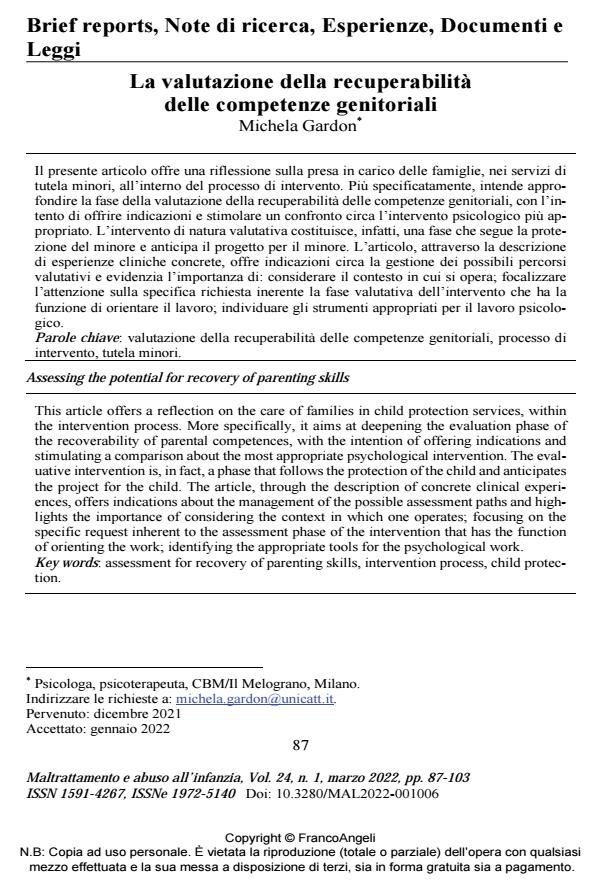Assessing the potential for recovery of parenting skills
Journal title MALTRATTAMENTO E ABUSO ALL’INFANZIA
Author/s Michela Gardon
Publishing Year 2022 Issue 2022/1
Language Italian Pages 17 P. 87-103 File size 221 KB
DOI 10.3280/MAL2022-001006
DOI is like a bar code for intellectual property: to have more infomation
click here
Below, you can see the article first page
If you want to buy this article in PDF format, you can do it, following the instructions to buy download credits

FrancoAngeli is member of Publishers International Linking Association, Inc (PILA), a not-for-profit association which run the CrossRef service enabling links to and from online scholarly content.
This article offers a reflection on the care of families in child protection services, within the intervention process. More specifically, it aims at deepening the evaluation phase of the recoverability of parental competences, with the intention of offering indications and stimulat-ing a comparison about the most appropriate psychological intervention. The evaluative in-tervention is, in fact, a phase that follows the protection of the child and anticipates the pro-ject for the child. The article, through the description of concrete clinical experiences, offers indications about the management of the possible assessment paths and highlights the importance of considering the context in which one operates; focusing on the specific request inherent to the assessment phase of the intervention that has the function of orienting the work; identifying the appropriate tools for the psychological work.
Keywords: assessment for recovery of parenting skills, intervention process, child protec-tion.
- Cancrini, L. (2012). La cura delle infanzie infelici. Milano: Cortina.
- Bertotti, T. (2012). Bambini e famiglie in difficoltà. Roma: Carrocci Faber Editore
- Cigala, A., & Mori, A. (2016). Le competenze emotive in bambini con storia di maltrattamento: cosa ci dice la ricerca?. Maltrattamento e abuso all’infanzia, 2 suppl., 29-42. DOI: 10.3280/MAL2016-S02003
- Cirillo, S. (2005). Cattivi genitori. Milano: Cortina.
- Cirillo, S., & Di Blasio, P. (1989). La famiglia maltrattante. Milano: Cortina.
- Cirillo, S., Berrini, R., Cambiaso, G., & Mazza R. (2017). La famiglia del tossicodipendente. Milano: Cortina.
- Cirillo, S., Selvini, M., & Sorrentino, A.M. (2016). Entrare in terapia. Milano: Cortina.
- Di Blasio, P. (2005). Tra rischio e protezione. Milano: Unicopli.
- Doherty, W. J. (1997). Scrutare nell’anima. Milano: Cortina.
- Grumi, S., & Mascheroni, E. (2017). Padri maltrattanti coinvolti nella Tutela Minorile: un focus sui fattori di rischio e di protezione. Maltrattamento e abuso all’infanzia, 3, 111-123. DOI: 10.3280/MAL2017-003007
- Ionio, C., & Mascheroni, E. (2014). L’impatto delle esperienze di vita negative della madre sul bambino. Maltrattamento e abuso all’infanzia, 3, 87-104. DOI: 10.3280/MAL2014-003006
- Il servizio educativo domiciliare rivolto a minori e famiglie: un modello operativo integrato Luisella Mattiace, in MALTRATTAMENTO E ABUSO ALL'INFANZIA 2/2024 pp.117
DOI: 10.3280/MAL2024-002007
Michela Gardon, La valutazione della recuperabilità delle competenze genitoriali in "MALTRATTAMENTO E ABUSO ALL’INFANZIA" 1/2022, pp 87-103, DOI: 10.3280/MAL2022-001006